Atom Learning is a UK-based online tutoring and practice platform for ages 7–11 (Key Stage 2) and 11+ exam prep. This article reviews Atom Learning’s reputation, pricing, features, and alternatives. It summarizes parent and tutor feedback, explains how Atom works, covers pricing details, and compares Atom with competitors like My Engineering Buddy.
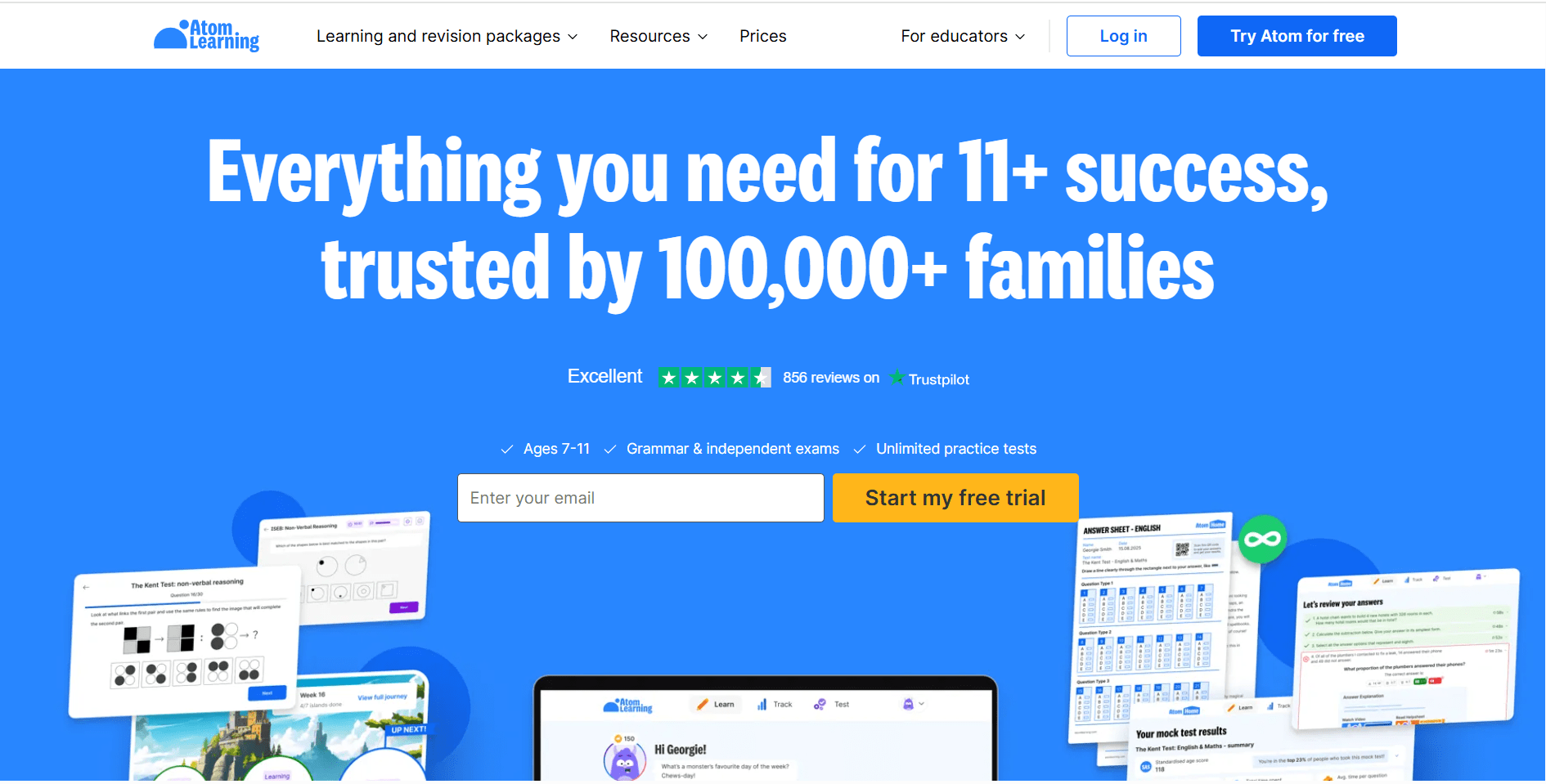
Atom Learning Reviews and Testimonials
Trustpilot (Parent Reviews)
On Atom Learning’s site, parent testimonials (sourced from Trustpilot) highlight very positive experiences. For example, one parent says “Tutors were nothing short of sensational,” and another notes their daughter eagerly anticipated each session. Many parents report improved exam offers (e.g. “finally got the offer from our target school”. These reviews praise knowledgeable, encouraging tutors and good communication. No official average rating is given, but the tone is strongly positive.
EdTechImpact (Educator Reviews)
EdTechImpact (an edtech review site) rates Atom’s school-oriented platform highly 4.7 out of 5 from 28 reviews. Teachers and education leaders note that pupils “enjoy” Atom’s adaptive and show clear progress. For instance, an educator wrote that Atom is a “fantastic platform” with excellent support helping students prepare effectively. This suggests the program is well-made for curriculum learning.
Tutor/Employee Reviews (Indeed/Glassdoor)
Tutors working for Atom also give good feedback. On Indeed, Atom has a 4.0/5.0 average rating from UK tutor reviews. Tutors praise the platform, calling it “excellent” with helpful materials (videos and PDFs) and noting an “amazing virtual platform” for teaching. However, some employee reviews note average pay: Indeed shows “Pay and Benefits” rated only 3.3/5, indicating room for improvement. Overall, tutors report a smooth teaching experience, but note compensation as a minor downside.
Parent Blogs and Testimonials
Independent parent blogs (e.g. DallasMoms, Mammaprada) also review Atom. For example, one UK parent blog mentions a year-round free trial and content aligned to 11+ exams. Bloggers often report that the on-demand tutors and practice questions boosted their child’s confidence and readiness. Such grassroots reviews conclude Atom Learning is a legitimate service that many families trust for exam prep and core skills.
In summary, Atom Learning appears to be well-regarded and legitimate. Parents and educators consistently praise its adaptive content and results, while tutors note the platform’s quality (albeit with mixed comments on pay). The consensus is that Atom Learning delivers on its promises of effective online tutoring and exam practice.
Atom Learning Pricing
Pricing Range
Atom offers subscription packages (Atom Home) for parents. The basic plan (English, Maths & Science) is £39.99 per month, the Exam Prep plan is £59.99/month, and the full Exam Prep Plus is £69.99/month. These include unlimited access to practice questions, videos, and mock tests. If paid annually, customers save 20% (e.g. £383.90/year for the core subjects plan). In addition to subscription, families can arrange 1:1 tuition with online tutors (custom packages). Atom tutors themselves earn about £36 per hour, which is in line with UK Key Stage 2 private tutoring rates (~£27–35/h). No extra “commission” is listed beyond the subscription fee.
What Students Say About Atom’s Pricing
Customers generally consider Atom’s subscription competitive for the all-in-one service. For context, a typical KS2 private tutor costs ~£27/hour}, so a £39.99 monthly plan (covering 3 subjects) can be seen as a good value. Reviews imply many families feel the price is justified by the adaptive platform and results. Some parents note that if only one subject or occasional practice is needed, it might seem expensive in the long run. Overall, opinions vary: users appreciate the bundled resources, while some wish for more flexible pricing if only limited use is needed.
Hidden Costs
Atom Learning’s pricing is relatively transparent. There is no signup fee, and users can cancel anytime. A five-day free trial is offered to test the platform without commitment. After the trial, the chosen plan auto-renews but can be cancelled without penalty. The only additional cost comes from optional 1:1 tutoring, which is arranged separately through the platform (pricing depends on tutor and package). We found no hidden charges for registration or cancellation; if you stop the subscription, you simply lose access when the paid period ends.
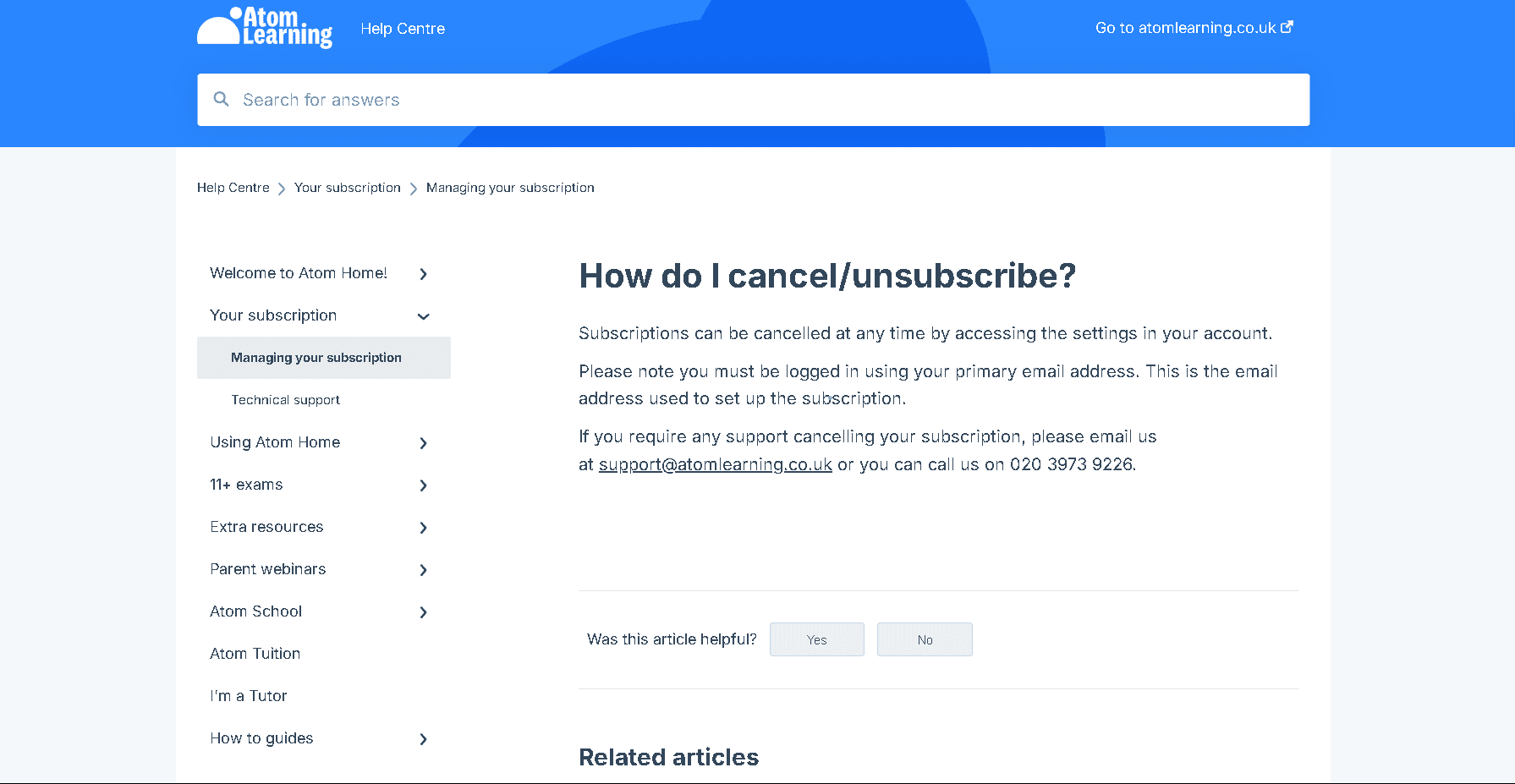
How Atom’s Pricing Works
Payments are by credit/debit card. New customers get a five-day free trial. If you continue, the first payment is automatically taken on day 5. Monthly subscribers are billed on the same date each month thereafter. Annual plans are billed once a year on the subscription start date, with the 20% discount applied upfront. Atom does not charge for cancellation; you retain access to the service until the day before the next renewal. Occasionally Atom may offer promo codes or sibling discounts (for adding extra children), but the main structured savings are through the annual plans. In summary, Atom’s billing is simple: pay as you go, or pay yearly for a discount, with easy online management.
Free Trial
All new users get a free 5-day trial of Atom Home. During this trial you can explore lessons and mock tests at no cost. To use the trial, simply sign up on Atom’s website and enter payment details; the trial ends automatically on day five unless you cancel. This allows families to judge if the platform meets their needs before committing. The trial is clearly stated in FAQs and on the pricing page.
Refund Policy
Atom’s official policy emphasizes easy cancellation rather than refunds. Their FAQ states you can cancel anytime and continue using the service until the end of the paid period. They do not offer prorated refunds if you cancel mid-cycle. We found no public “money-back guarantee” beyond the trial. (Note: one unrelated site mentions a 14-day refund with fees, but this appears not to be Atom’s official policy.) In practice, refunds are not a standard part of Atom Home subscriptions – users typically cancel to stop future payments.
Atom Learning Alternatives
Some families may look at other options. Reasons include needing services for different age groups, budgets, or subject focus. Below are several alternatives to consider:
My Engineering Buddy
My Engineering Buddy (MEB) is a tutoring platform focusing on STEM and homework help across college and high-school levels. MEB has a very high customer rating (4.8/5 from 287 reviews) and serves students in the US, UK, Canada, Australia and Gulf countries. It offers 1:1 online tutors for math, science, engineering, and coding. Pros: specialized tutors in technical subjects, global reach, and strong user satisfaction. Cons: It’s mainly focused on older students (not KS2 age), and pricing is per-session or package rather than a subscription. Compared to Atom, MEB is better for high-school/college STEM help, but it may not cover UK-specific curriculum or 11+ exams.
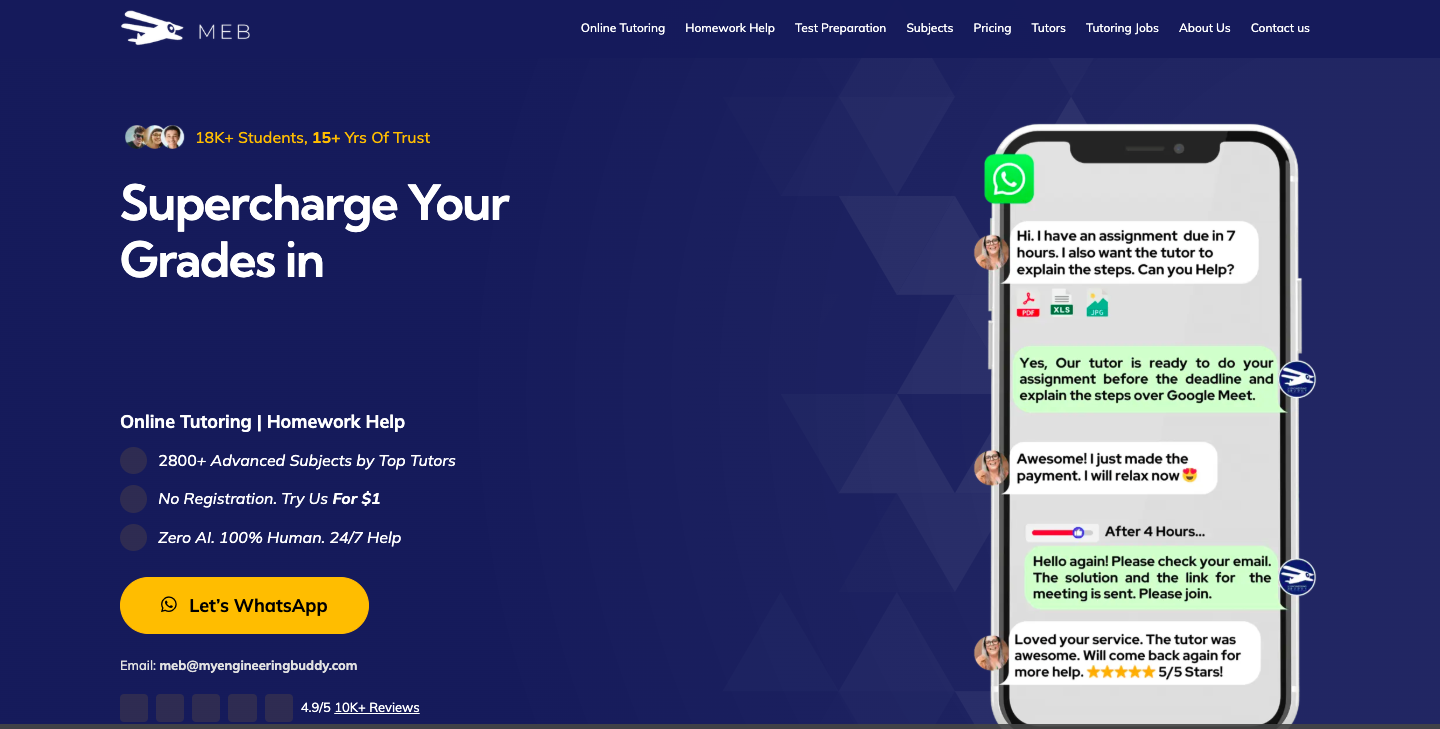
Khan Academy
Khan Academy is a well-known free learning platform covering math, science, economics, and more. It offers video tutorials and practice questions at no cost. Pros: completely free, wide range of subjects, and students can learn at their own pace. Cons: there are no live tutors or personal feedback; learning is entirely self-guided. Khan Academy lacks the interactive, AI-driven personalization of Atom and has only one teaching style (video lessons). It’s great for independent practice, but families who want structured curriculum support and real tutors would prefer Atom.
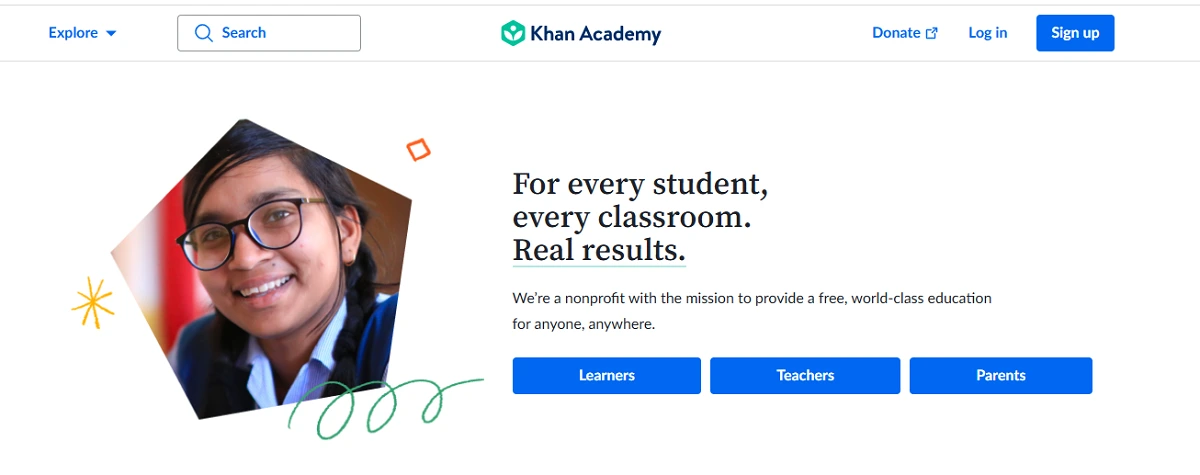
Online Tutoring Marketplaces (e.g. Chegg/Tutor.com)
Websites like Chegg Tutors or Tutor.com let you find freelance tutors on demand. Pros: many subject options (including college-level), pay-as-you-go pricing, and instant help is often available. Cons: quality varies by tutor, and costs can add up per hour. These platforms lack Atom’s cohesive curriculum and adaptive tracking. They are suitable if you need occasional homework help or college subjects. However, for a younger child needing structured exam prep, Atom’s specialized content is stronger.

Piai Academy (PIA Academy)
PIA Academy is a UK tutoring service focused on 11+ exam preparation (group classes and private tutoring). Pros: Exam-specific coaching and past papers for common test boards. Cons: classes often in-person or group, and less flexible scheduling. Compared to Atom, PIA is narrower (11+ only) and often more expensive per lesson. Atom covers core KS2 subjects plus some exam practice digitally. Families might choose PIA if they want intensive test-cram classes; Atom appeals to those wanting ongoing online practice and adaptive learning.
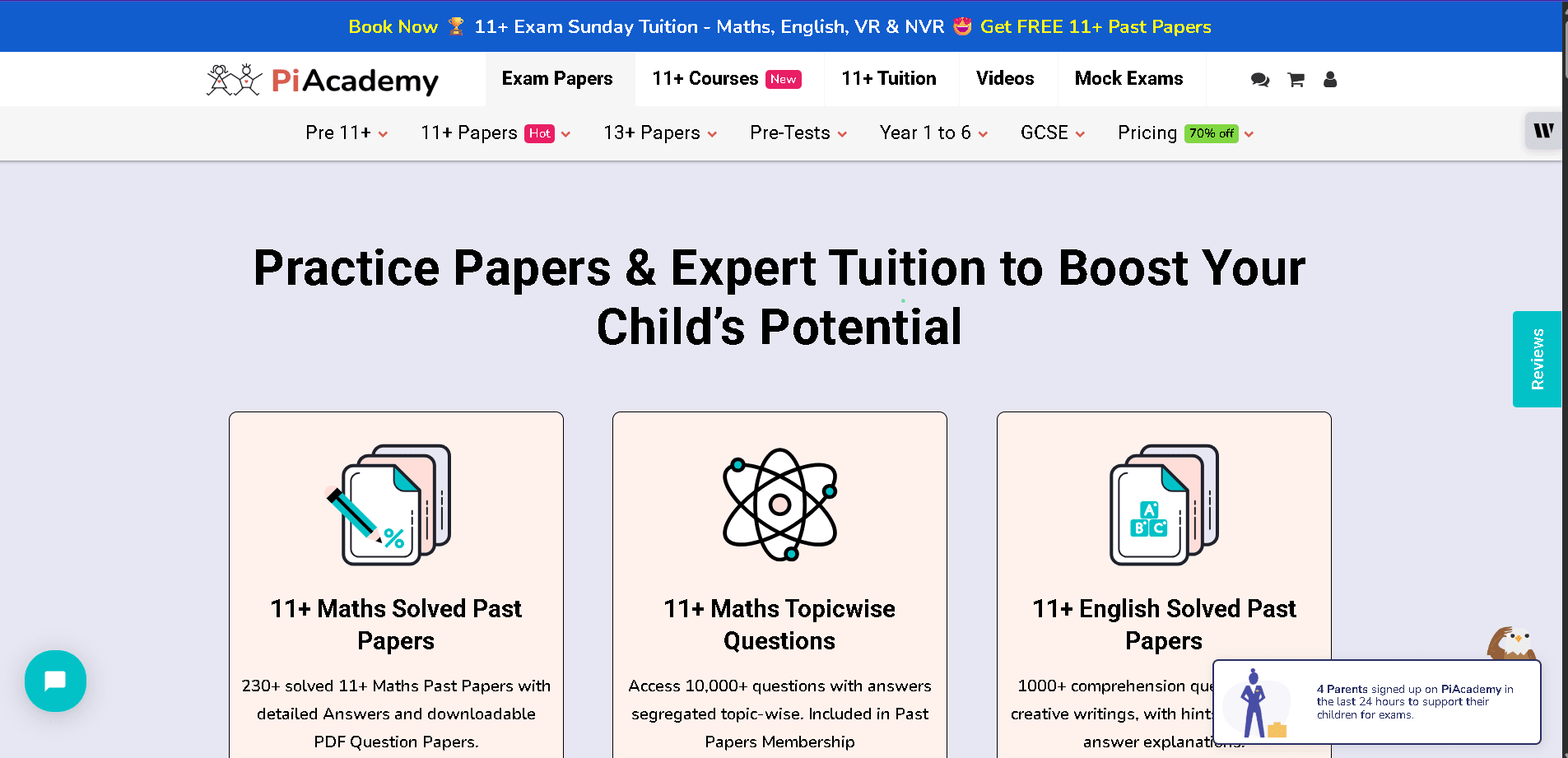
Other Platforms
There are many other learning platforms (e.g. Mathnasium, Brainly, Microsoft Math Solver, YouTube math channels) each with pros/cons. Often, the choice depends on budget, age, and learning style. In general, Atom Learning stands out for its tailored, UK-focused content and integrated tutor support. Alternatives like Khan Academy or MEB either serve different subjects/ages or a different (subscription-free or on-demand) model.
How it Works?
For Students
Students access Atom through a web portal (Atom Home). To get started, parents sign up on the Atom website and create an account, entering the child’s name, birth date and target exam (if any). This setup tells Atom the student’s school year and exam board. The child then logs in to Atom Home, where they see practice exercises and videos in their subjects. The platform is fully adaptive: each time the child answers questions, Atom’s algorithm analyzes the results and delivers questions at the right level of difficulty. Over time, students receive a personalized weekly study plan focused on their weak areas. Parents can view detailed reports on a dashboard (showing scores, topics covered, and curriculum attainment). If the child needs one-on-one help, the parent clicks the “1 to 1 Tuition” tab in their account. Atom then arranges a qualified tutor match. Tutoring sessions are scheduled online through Atom’s system, typically via video call. After each session, the tutor provides progress feedback in the platform. In summary, from a student perspective, Atom works as a self-guided learning app with optional live tutoring, all coordinated through the parent account.
For Tutors
Becoming an Atom tutor involves applying online. Tutors must have subject expertise (usually a university degree or in progress) and some tutoring or teaching experience. Applicants fill out a form and upload a CV on Atom’s careers page. Atom will review qualifications and often conduct an interview. Successful tutors are onboarded with guidance (Atom advertises free training webinars for tutors. Once on the platform, Atom delivers a steady stream of students: as one tutor notes, Atom “delivers clients to your inbox every day”. Tutors use the Atom Tutor Portal to plan lessons: they can view each student’s progress and it even suggests topics to cover. During sessions (online only), tutors work with Atom’s materials (worksheets, videos, mock tests) to reinforce concepts. They teach lessons one-on-one, set practice work on Atom Home, and write up reports after each class. Tutors earn on an hourly basis (around £36/hr plus occasional bonuses). Scheduling is flexible: tutors set their own availability and take lessons from home. According to tutor testimonials, Atom makes lesson prep easy and keeps teaching engaging. In short, Atom’s model hires tutors as independent contractors who focus solely on teaching, while Atom handles student matching, payments and support. (Interested tutors can apply via Atom’s website.)
FAQs About Atom Learning
Q: How much do Atom tutors earn? A: Atom advertises that tutors earn around £36 per hour (plus incentives). Tutors are self-employed and can teach 1-on-1 lessons through Atom for the approved rate.
Q: How do students access their Atom lessons? A: Students access Atom via a web browser or tablet. Parents create a free Atom account, set up the child’s profile, and then the child logs into Atom Home online to do lessons. There is no separate app download.
Q: Is Atom Learning effective or legitimate? A: Yes. Atom is used by tens of thousands of UK students and is backed by investors. Third-party reviews are mostly positive – for example, EdTechImpact gives Atom 4.7/5 based on educator feedback, and teachers praise its adaptive content. Many parents report their child reaching target scores and school offers. Atom is a bona fide, award-winning platform, not a scam.
Q: How do I cancel my subscription or get a refund? A: You can cancel at any time through your online parent account. After cancellation, you retain access until the next billing date, after which the subscription ends. Atom does not advertise refunds beyond the initial trial period. In practice, there is no pro-rated refund if you cancel mid-cycle.
Q: What content does Atom cover? A: Atom Home covers English, Maths, and Science at Key Stage 2 (ages 7–11). Its exam packages add preparation for 11+ entry exams (including verbal/non-verbal reasoning). It is tailored to the UK curriculum but can help with international exams of similar level. Atom does not currently offer courses beyond the 11+ level.
Q: How does Atom Learning compare to My Engineering Buddy? A: Atom focuses on primary school-aged learning and entrance exam prep, with a UK curriculum and adaptive practice. My Engineering Buddy targets high school and college STEM and offers specialized homework help. Atom’s strength is structured curriculum-based lessons; MEB’s strength is subject-matter expertise in engineering and math. Notably, MEB has a 4.8/5 user rating from 287 reviews. Families needing KS2 education will lean toward Atom, while those seeking engineering/math tutoring at higher levels may prefer MEB.
Q: Does Atom work internationally and what languages? A: Atom is based in the UK and all its content is in English. However, since it is online, students from English-speaking countries (US, Canada, Australia, Gulf states, etc.) can use it. There is no multilingual support – all materials are English-only. Tutors may be from any country as long as they teach in English.
Q: Can siblings share one account? A: No. Each child needs their own Atom Home subscription. Atom’s adaptive algorithm requires separate profiles for each learner. Parents can add multiple children under one login, but each child’s learning plan is billed individually (though you can request a sibling discount from support).
Atom Learning: Company Information
Atom Learning Ltd was founded in 2018 by Alex Hatvany and Jake O’Keeffe (both former tutors). It is headquartered in London, UK. The company’s mission is to improve outcomes for primary school children through technology (adaptive learning and AI). Atom’s core service (Atom Home) is an online learning platform covering Key Stage 2 subjects (English, Maths, Science) and 11+ exam prep, integrated with optional 1:1 tutoring. By late 2021, Atom was used by about 500 UK schools (~100,000 students)}. The team is relatively small (tens of staff plus hundreds of freelance tutors) and the platform is available globally (English language only).
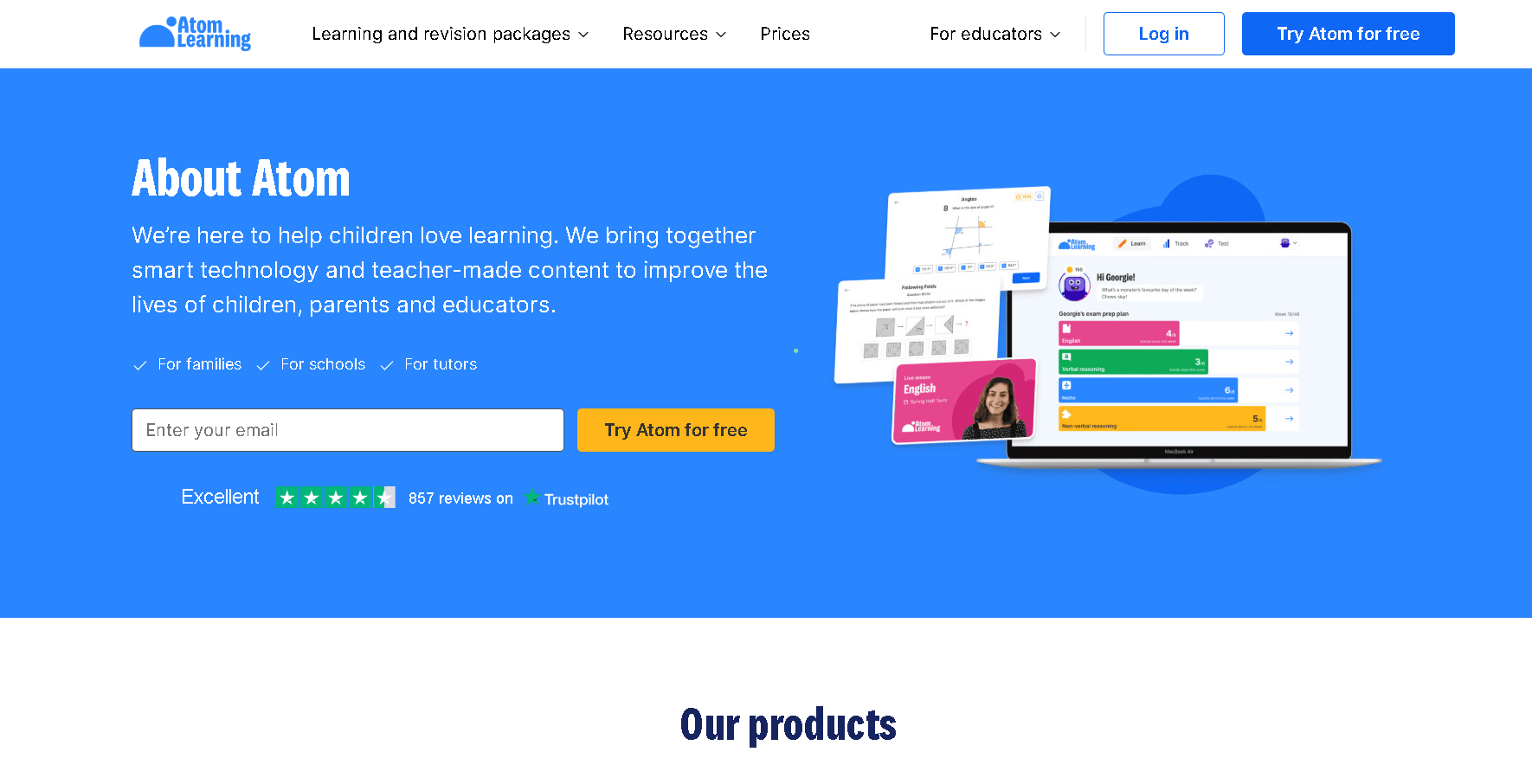
USP of Atom Learning
- AI-driven adaptive learning: Atom’s system personalizes lessons using machine learning, so each student gets questions at the right level. This ensures efficient learning and addresses individual gaps.
- Curriculum-aligned content: The exercises and mock tests are written in-house by educational experts to match UK standards and common exams. Teachers say the content is “fantastic” and exam-focused.
- Integrated platform and tutoring: Atom combines self-study materials with live 1:1 tutoring. The integrated portal lets tutors see student data and parents track progress. One tutor found the portal “invaluable” for tailoring teaching.
- Progress analytics for parents: The parent dashboard shows detailed progress (subtopic breakdown, comparisons to national peers). Educators and parents value the transparency this provides.
- Strong outcomes: Atom reports high success rates (e.g. 89% first-choice exam offers for students using it in 2025). Independent reviews agree Atom delivers results, as reflected in high ratings.
Drawbacks of Atom Learning
- Subscription model only: no option to buy individual lessons. Families must commit to a monthly/annual fee for each child, which some find expensive long-term.
- Limited age range: Content stops at 11+ prep (suitable for early secondary only). It does not cover higher GCSE/A-level material.
- One child per account: Each child needs their own paid subscription, so multiple siblings mean higher cost (though sibling discounts are possible).
- Moderate tutor pay: Some tutor feedback notes average pay levels (Indeed shows tutor pay rating ~3.3/5), which might affect tutor recruitment/retention.
- English-only content: No support for other languages (all materials are English), which limits non-English speakers.
Comparison with My Engineering Buddy
Atom Learning and My Engineering Buddy (MEB) serve different needs. Atom is strongest in KS2/11+ academic tutoring with an adaptive UK curriculum. MEB focuses on STEM homework help for older students, with hundreds of subject tutors. Users report excellent results with both. In side-by-side comparisons, Atom users praise its structured learning path, while MEB users highlight expert tutors for college-level topics. For example, one MEB reviewer says Atom covers core subjects well, but MEB offers in-depth help for engineering and programming. Families should choose Atom if they need broad primary/11+ support and prefer a curriculum-aligned plan; they should choose MEB if they need specialized math/science help or support beyond KS2. (MEB’s high customer rating.)
Customer Support and Policies
Their website says parents can contact Education Experts anytime. They also hold regular parent webinars. Support agents are generally responsive according to user comments. On cancellation and refunds, Atom’s policy is to allow cancellations at any time (no penalty). Officially, they do not advertise refunds beyond prorated adjustments. By contrast, some competitors like MEB boast more flexible refund handling: one MEB tutor review notes the company “promptly refunded” any issues and offers 24/7 student support. In summary, Atom’s support is solid (24/7 chat is available during business hours), with clear cancellation, but refunds are limited; MEB’s policies are similar but emphasize quick turn-around on refunds based on reviews.
Global Reach and Localization
Atom’s platform is English-only and is designed around the UK school system. It is most popular in the UK and other English-speaking countries. According to TechCrunch, it was used in over 500 UK schools (about 100,000 students) by 2021. Atom has plans to expand internationally, but it still primarily serves UK families. For other regions, Atom can be used, but content may not align with local curricula outside the UK. By contrast, My Engineering Buddy explicitly serves students globally (US, UK, Australia, Gulf, etc.)and specializes in universal STEM subjects. Neither platform currently offers multi-language interfaces.
Atom Learning’s Future Plans
Atom continues to invest in its AI-driven platform. In late 2021 it raised $25 million (led by SoftBank) to “build out the data science and content” and to expand into new markets. The founders have indicated plans to grow internationally and possibly extend their adaptive approach to more age groups. The platform already uses machine learning to tailor lessons. We expect Atom to roll out new content (e.g. Key Stage 3 material) and enhanced analytics over time. However, as of now detailed public roadmaps are limited; families should watch Atom’s announcements for upcoming features. The focus remains on improving personalization and extending reach using cutting-edge technology.
FAQs About Atom Learning
Q: How much do Atom tutors earn? A: Atom advertises that tutors earn about £36 per hour, plus possible bonuses. This rate is comparable to professional tutoring pay in the UK.
Q: How do I access Atom Learning as a student? A: Students use Atom via the website (app.atomlearning.com). Parents create an account, set up their child’s profile, then the child logs in online to work through lessons. There is no mobile app; it runs in a browser on a computer or tablet.
Q: Can I pause or cancel anytime? A: Yes. You can cancel your subscription at any time through your parent dashboard. After cancelling, you keep access until the end of the current paid period, then it stops. Atom does not use long-term lock-in contracts.
Q: What if I’m not satisfied after subscribing? A: Atom’s main safety net is the free trial. After that, there is no formal money-back guarantee. They will cancel future billing on request, but do not typically issue refunds for unused time.
Q: What features does Atom have for parents? A: The parent portal offers detailed progress reports, topic breakdowns, and comparison to exam benchmarks. Parents can also message the support team or attend webinars for advice.
Q: How does Atom compare to Khan Academy? A: Khan Academy is a free, general resource with videos and exercises. It covers many subjects but has no live help. Atom, by contrast, provides a UK curriculum path, adaptive content and optional live tutors for a fee. Khan is great for supplemental practice, while Atom is a paid structured tutoring solution.
Q: Is Atom worth the money? A: That depends on your child’s needs and budget. Many parents feel the subscription is justified by the quality content and tracking it provides, especially if used regularly. Others may find it steep if they need it only for a short term. Consider how it compares to paying private tutors by the hour (typically ~£25–35/hr).
Conclusion
Atom Learning excels at structured online learning for Key Stage 2 and 11+ exams, with smart technology and solid reviews. Its main advantages are personalized adaptive lessons and integration with live tutors. Downsides include the subscription cost, English-only content, and focus on younger students. For families needing STEM or higher-level help, My Engineering Buddy is a strong alternative (it has even higher ratings and covers older students). Overall, Atom Learning offers a reputable, comprehensive tutoring platform for its target age group, and is a leading choice unless your needs lie outside its scope.

